英语语言为旅游酒店发展插上翅膀
旅游与酒店业的可持续发展英语作文
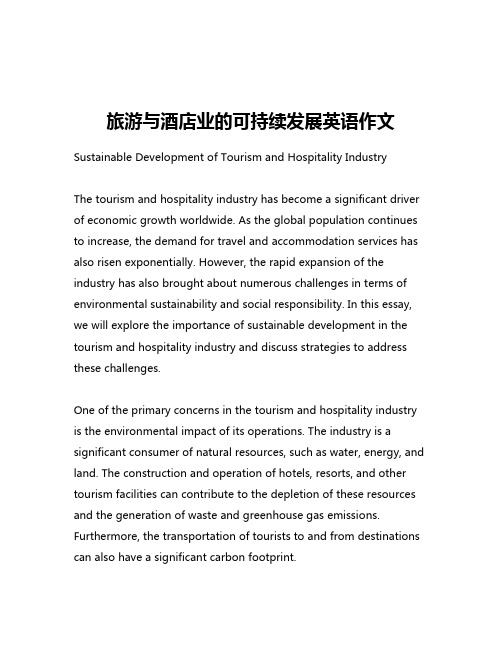
旅游与酒店业的可持续发展英语作文Sustainable Development of Tourism and Hospitality IndustryThe tourism and hospitality industry has become a significant driver of economic growth worldwide. As the global population continues to increase, the demand for travel and accommodation services has also risen exponentially. However, the rapid expansion of the industry has also brought about numerous challenges in terms of environmental sustainability and social responsibility. In this essay, we will explore the importance of sustainable development in the tourism and hospitality industry and discuss strategies to address these challenges.One of the primary concerns in the tourism and hospitality industry is the environmental impact of its operations. The industry is a significant consumer of natural resources, such as water, energy, and land. The construction and operation of hotels, resorts, and other tourism facilities can contribute to the depletion of these resources and the generation of waste and greenhouse gas emissions. Furthermore, the transportation of tourists to and from destinations can also have a significant carbon footprint.To address these environmental concerns, the industry has begun to adopt various sustainable practices. One of the most prominent strategies is the implementation of energy-efficient technologies and renewable energy sources. Many hotels and resorts are now equipped with solar panels, LED lighting, and energy-efficient appliances, which can significantly reduce their energy consumption and carbon emissions. Additionally, some establishments have implemented water-saving measures, such as the use of low-flow showerheads and the recycling of greywater for irrigation.Another important aspect of sustainable development in the tourism and hospitality industry is the promotion of eco-tourism. Eco-tourism is a form of tourism that focuses on the conservation of natural environments and the engagement of local communities. This approach encourages travelers to explore destinations in a way that minimizes their environmental impact and supports the local economy. By promoting eco-tourism, the industry can contribute to the preservation of natural habitats and the empowerment of local communities.In addition to environmental sustainability, the tourism and hospitality industry must also address social responsibility. This includes ensuring fair labor practices, promoting diversity and inclusion, and supporting local communities. Many hotels and resorts are now taking steps to improve the working conditions andwages of their employees, as well as to provide training and development opportunities. Additionally, some establishments are working to support local businesses and community initiatives, such as by sourcing local products and services.One of the key challenges in achieving sustainable development in the tourism and hospitality industry is the need to balance economic growth with environmental and social considerations. This requires a collaborative effort among industry stakeholders, policymakers, and local communities. Governments can play a crucial role in this process by implementing regulations and incentives that encourage sustainable practices, such as tax breaks for eco-friendly investments and the development of sustainable tourism infrastructure.Furthermore, the industry can also play a significant role in raising awareness and educating travelers about the importance of sustainable tourism. By providing information about the environmental and social impacts of travel, and by offering sustainable travel options, the industry can empower travelers to make more informed and responsible choices.In conclusion, the sustainable development of the tourism and hospitality industry is essential for addressing the environmental and social challenges that the industry faces. By adopting sustainable practices, promoting eco-tourism, and fostering social responsibility,the industry can contribute to the creation of a more sustainable and equitable future. As the industry continues to grow, it is crucial that all stakeholders work together to ensure that the benefits of tourism are shared in a way that is environmentally and socially responsible.。
英语作文-旅游饭店行业:迎来蓬勃发展的黄金时代
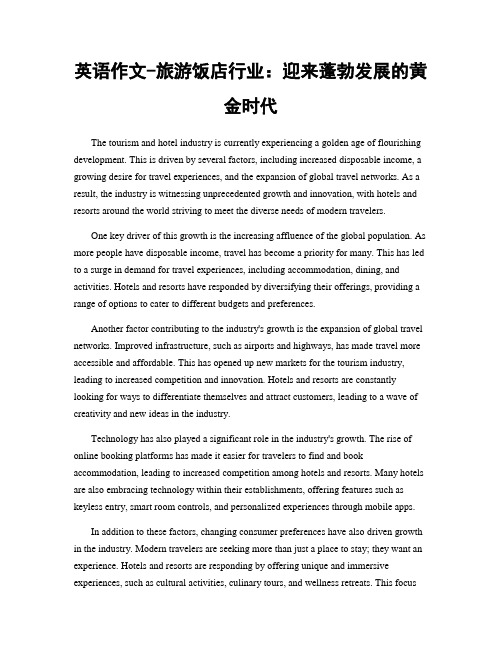
英语作文-旅游饭店行业:迎来蓬勃发展的黄金时代The tourism and hotel industry is currently experiencing a golden age of flourishing development. This is driven by several factors, including increased disposable income, a growing desire for travel experiences, and the expansion of global travel networks. As a result, the industry is witnessing unprecedented growth and innovation, with hotels and resorts around the world striving to meet the diverse needs of modern travelers.One key driver of this growth is the increasing affluence of the global population. As more people have disposable income, travel has become a priority for many. This has led to a surge in demand for travel experiences, including accommodation, dining, and activities. Hotels and resorts have responded by diversifying their offerings, providing a range of options to cater to different budgets and preferences.Another factor contributing to the industry's growth is the expansion of global travel networks. Improved infrastructure, such as airports and highways, has made travel more accessible and affordable. This has opened up new markets for the tourism industry, leading to increased competition and innovation. Hotels and resorts are constantly looking for ways to differentiate themselves and attract customers, leading to a wave of creativity and new ideas in the industry.Technology has also played a significant role in the industry's growth. The rise of online booking platforms has made it easier for travelers to find and book accommodation, leading to increased competition among hotels and resorts. Many hotels are also embracing technology within their establishments, offering features such as keyless entry, smart room controls, and personalized experiences through mobile apps.In addition to these factors, changing consumer preferences have also driven growth in the industry. Modern travelers are seeking more than just a place to stay; they want an experience. Hotels and resorts are responding by offering unique and immersive experiences, such as cultural activities, culinary tours, and wellness retreats. This focuson experiences has helped hotels and resorts differentiate themselves in a crowded market and attract a loyal customer base.Overall, the tourism and hotel industry is currently experiencing a golden age of growth and innovation. Factors such as increasing affluence, expanding travel networks, technological advancements, and changing consumer preferences are driving this growth, leading to a wave of creativity and new ideas in the industry. As hotels and resorts continue to evolve to meet the needs of modern travelers, the future of the industry looks bright.。
英语作文-旅游饭店行业:引领时代的新兴力量
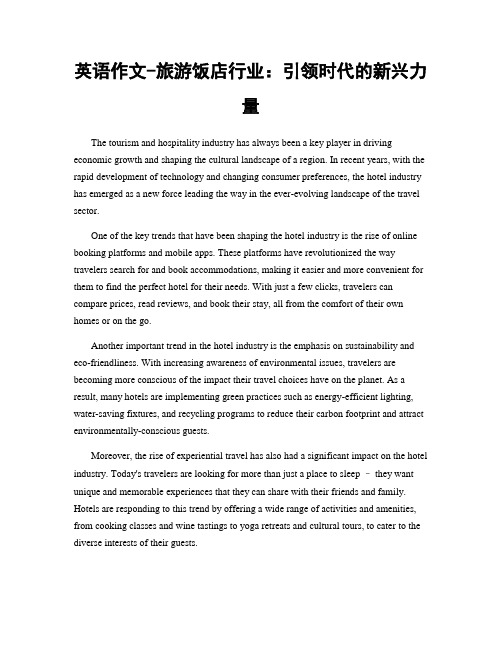
英语作文-旅游饭店行业:引领时代的新兴力量The tourism and hospitality industry has always been a key player in driving economic growth and shaping the cultural landscape of a region. In recent years, with the rapid development of technology and changing consumer preferences, the hotel industry has emerged as a new force leading the way in the ever-evolving landscape of the travel sector.One of the key trends that have been shaping the hotel industry is the rise of online booking platforms and mobile apps. These platforms have revolutionized the way travelers search for and book accommodations, making it easier and more convenient for them to find the perfect hotel for their needs. With just a few clicks, travelers can compare prices, read reviews, and book their stay, all from the comfort of their own homes or on the go.Another important trend in the hotel industry is the emphasis on sustainability and eco-friendliness. With increasing awareness of environmental issues, travelers are becoming more conscious of the impact their travel choices have on the planet. As a result, many hotels are implementing green practices such as energy-efficient lighting, water-saving fixtures, and recycling programs to reduce their carbon footprint and attract environmentally-conscious guests.Moreover, the rise of experiential travel has also had a significant impact on the hotel industry. Today's travelers are looking for more than just a place to sleep – they want unique and memorable experiences that they can share with their friends and family. Hotels are responding to this trend by offering a wide range of activities and amenities, from cooking classes and wine tastings to yoga retreats and cultural tours, to cater to the diverse interests of their guests.In addition, the concept of personalized service has become increasingly important in the hotel industry. With competition heating up, hotels are looking for ways to stand out and create a loyal customer base. By offering personalized experiences, such as customized room amenities, tailored dining options, and personalized concierge services, hotels can create a unique and unforgettable stay for their guests, ensuring they keep coming back time and time again.Overall, the hotel industry is undergoing a period of transformation, driven by changing consumer preferences and technological advancements. By embracing these trends and staying ahead of the curve, hotels can position themselves as leaders in the travel industry, offering innovative and memorable experiences that will keep guests coming back for more. As the new emerging force in the travel sector, hotels have the opportunity to shape the future of travel and set new standards for excellence in hospitality.。
英语作文-揭晓旅游饭店行业的兴盛与成就
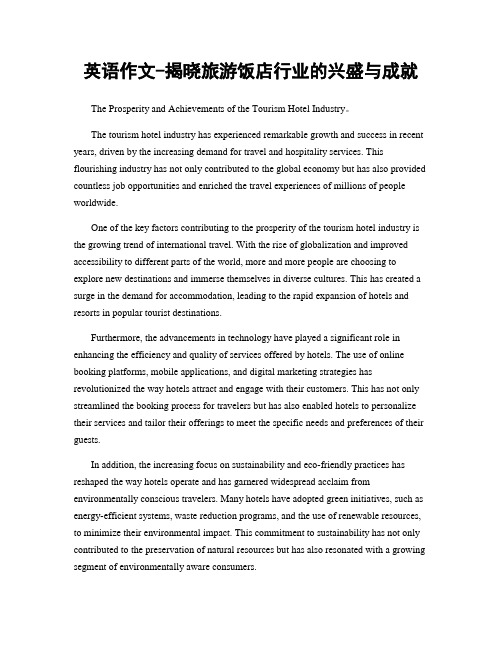
英语作文-揭晓旅游饭店行业的兴盛与成就The Prosperity and Achievements of the Tourism Hotel Industry。
The tourism hotel industry has experienced remarkable growth and success in recent years, driven by the increasing demand for travel and hospitality services. This flourishing industry has not only contributed to the global economy but has also provided countless job opportunities and enriched the travel experiences of millions of people worldwide.One of the key factors contributing to the prosperity of the tourism hotel industry is the growing trend of international travel. With the rise of globalization and improved accessibility to different parts of the world, more and more people are choosing to explore new destinations and immerse themselves in diverse cultures. This has created a surge in the demand for accommodation, leading to the rapid expansion of hotels and resorts in popular tourist destinations.Furthermore, the advancements in technology have played a significant role in enhancing the efficiency and quality of services offered by hotels. The use of online booking platforms, mobile applications, and digital marketing strategies has revolutionized the way hotels attract and engage with their customers. This has not only streamlined the booking process for travelers but has also enabled hotels to personalize their services and tailor their offerings to meet the specific needs and preferences of their guests.In addition, the increasing focus on sustainability and eco-friendly practices has reshaped the way hotels operate and has garnered widespread acclaim from environmentally conscious travelers. Many hotels have adopted green initiatives, such as energy-efficient systems, waste reduction programs, and the use of renewable resources, to minimize their environmental impact. This commitment to sustainability has not only contributed to the preservation of natural resources but has also resonated with a growing segment of environmentally aware consumers.Moreover, the hotel industry has witnessed a surge in the development of luxury and boutique hotels, offering unique and immersive experiences that cater to the discerning tastes of affluent travelers. These establishments have raised the bar for luxury accommodation, incorporating innovative designs, exclusive amenities, and personalized services to create unparalleled experiences for their guests. This has redefined the concept of luxury travel and has set new standards for excellence within the industry.Furthermore, the emergence of new travel trends, such as wellness tourism and experiential travel, has presented hotels with opportunities to diversify their offerings and appeal to niche markets. Hotels are now incorporating wellness facilities, such as spas, yoga studios, and healthy dining options, to cater to the growing demand for wellness-focused travel experiences. Additionally, the integration of local culture and immersive activities, such as cooking classes, cultural tours, and art workshops, has enriched the travel experiences of guests and provided them with a deeper understanding of the destinations they visit.In conclusion, the tourism hotel industry has experienced a period of unprecedented growth and achievement, driven by factors such as international travel, technological advancements, sustainability initiatives, luxury developments, and evolving travel trends. This thriving industry has not only contributed to the global economy but has also elevated the standard of hospitality and provided travelers with enriching and memorable experiences. As the industry continues to evolve, it is poised to further shape the future of travel and redefine the concept of hospitality.。
英语作文-探究旅游饭店行业的创新与突破之路
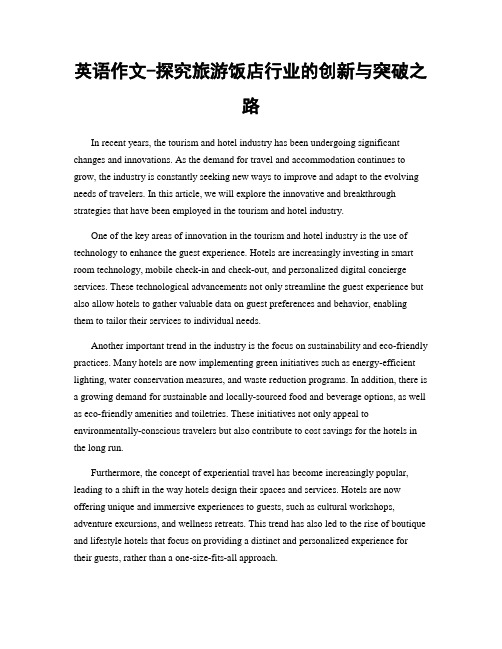
英语作文-探究旅游饭店行业的创新与突破之路In recent years, the tourism and hotel industry has been undergoing significant changes and innovations. As the demand for travel and accommodation continues to grow, the industry is constantly seeking new ways to improve and adapt to the evolving needs of travelers. In this article, we will explore the innovative and breakthrough strategies that have been employed in the tourism and hotel industry.One of the key areas of innovation in the tourism and hotel industry is the use of technology to enhance the guest experience. Hotels are increasingly investing in smart room technology, mobile check-in and check-out, and personalized digital concierge services. These technological advancements not only streamline the guest experience but also allow hotels to gather valuable data on guest preferences and behavior, enabling them to tailor their services to individual needs.Another important trend in the industry is the focus on sustainability and eco-friendly practices. Many hotels are now implementing green initiatives such as energy-efficient lighting, water conservation measures, and waste reduction programs. In addition, there is a growing demand for sustainable and locally-sourced food and beverage options, as well as eco-friendly amenities and toiletries. These initiatives not only appeal to environmentally-conscious travelers but also contribute to cost savings for the hotels in the long run.Furthermore, the concept of experiential travel has become increasingly popular, leading to a shift in the way hotels design their spaces and services. Hotels are now offering unique and immersive experiences to guests, such as cultural workshops, adventure excursions, and wellness retreats. This trend has also led to the rise of boutique and lifestyle hotels that focus on providing a distinct and personalized experience for their guests, rather than a one-size-fits-all approach.In addition to these trends, the rise of the sharing economy has also had a significant impact on the tourism and hotel industry. The popularity of platforms such as Airbnb has forced traditional hotels to rethink their business models and offerings. Many hotels are now embracing the concept of "home away from home" by creating more homely and communal spaces, as well as offering extended-stay options and apartment-style accommodations to cater to the changing preferences of travelers.Moreover, the COVID-19 pandemic has accelerated the adoption of contactless and hygiene-focused practices in the tourism and hotel industry. Hotels have implemented enhanced cleaning protocols, contactless payment options, and social distancing measures to ensure the safety and well-being of their guests. This has not only become a necessity in the current climate but is also likely to become a permanent fixture in the future of the industry.In conclusion, the tourism and hotel industry is constantly evolving and innovating to meet the changing needs and preferences of travelers. From the integration of technology and sustainability practices to the emphasis on experiential travel and the impact of the sharing economy, hotels are continuously seeking new ways to differentiate themselves and provide exceptional experiences for their guests. As the industry continues to navigate through challenges and opportunities, it is clear that innovation and adaptability will be key to success in the future.。
英语作文-解读旅游饭店行业的无限发展潜力
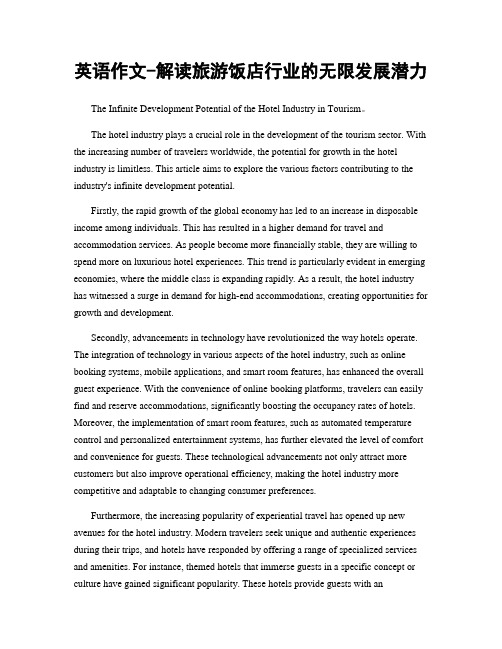
英语作文-解读旅游饭店行业的无限发展潜力The Infinite Development Potential of the Hotel Industry in Tourism。
The hotel industry plays a crucial role in the development of the tourism sector. With the increasing number of travelers worldwide, the potential for growth in the hotel industry is limitless. This article aims to explore the various factors contributing to the industry's infinite development potential.Firstly, the rapid growth of the global economy has led to an increase in disposable income among individuals. This has resulted in a higher demand for travel and accommodation services. As people become more financially stable, they are willing to spend more on luxurious hotel experiences. This trend is particularly evident in emerging economies, where the middle class is expanding rapidly. As a result, the hotel industry has witnessed a surge in demand for high-end accommodations, creating opportunities for growth and development.Secondly, advancements in technology have revolutionized the way hotels operate. The integration of technology in various aspects of the hotel industry, such as online booking systems, mobile applications, and smart room features, has enhanced the overall guest experience. With the convenience of online booking platforms, travelers can easily find and reserve accommodations, significantly boosting the occupancy rates of hotels. Moreover, the implementation of smart room features, such as automated temperature control and personalized entertainment systems, has further elevated the level of comfort and convenience for guests. These technological advancements not only attract more customers but also improve operational efficiency, making the hotel industry more competitive and adaptable to changing consumer preferences.Furthermore, the increasing popularity of experiential travel has opened up new avenues for the hotel industry. Modern travelers seek unique and authentic experiences during their trips, and hotels have responded by offering a range of specialized services and amenities. For instance, themed hotels that immerse guests in a specific concept or culture have gained significant popularity. These hotels provide guests with anopportunity to fully engage with the destination, creating unforgettable memories. Additionally, hotels are incorporating local elements into their design, cuisine, and activities, allowing guests to experience the local culture and traditions. By catering to the desire for immersive experiences, hotels can differentiate themselves from competitors and attract a larger customer base.Moreover, sustainability has become a key focus in the hotel industry, driving its development potential. As travelers become more conscious of their environmental impact, they are actively seeking eco-friendly accommodations. Hotels that prioritize sustainability by implementing energy-efficient practices, reducing waste, and supporting local communities are gaining a competitive edge. Sustainable practices not only attract environmentally conscious travelers but also contribute to cost savings for hotels in the long run. The integration of sustainability into the hotel industry not only aligns with global environmental goals but also enhances the industry's reputation and appeal.In conclusion, the hotel industry possesses immense potential for development within the tourism sector. Factors such as the growing global economy, technological advancements, the rise of experiential travel, and the emphasis on sustainability all contribute to this potential. By embracing these trends and continuously innovating, hotels can tap into the ever-increasing demand for unique and memorable travel experiences. The future of the hotel industry is bright, with endless possibilities for growth and success.。
英语作文-旅游饭店行业:迎来蓬勃发展
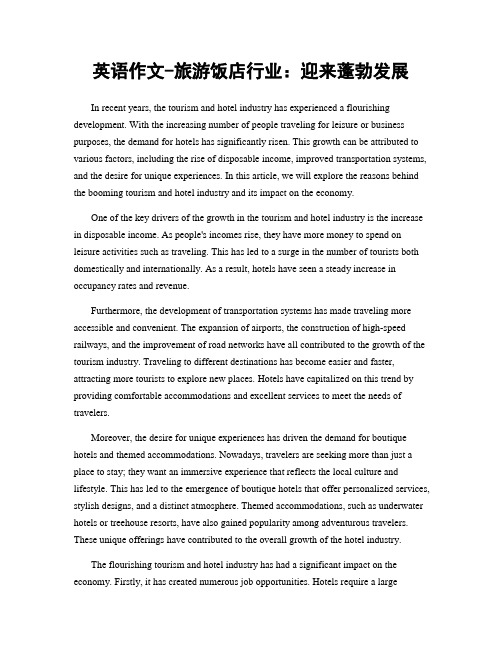
英语作文-旅游饭店行业:迎来蓬勃发展In recent years, the tourism and hotel industry has experienced a flourishing development. With the increasing number of people traveling for leisure or business purposes, the demand for hotels has significantly risen. This growth can be attributed to various factors, including the rise of disposable income, improved transportation systems, and the desire for unique experiences. In this article, we will explore the reasons behind the booming tourism and hotel industry and its impact on the economy.One of the key drivers of the growth in the tourism and hotel industry is the increase in disposable income. As people's incomes rise, they have more money to spend on leisure activities such as traveling. This has led to a surge in the number of tourists both domestically and internationally. As a result, hotels have seen a steady increase in occupancy rates and revenue.Furthermore, the development of transportation systems has made traveling more accessible and convenient. The expansion of airports, the construction of high-speed railways, and the improvement of road networks have all contributed to the growth of the tourism industry. Traveling to different destinations has become easier and faster, attracting more tourists to explore new places. Hotels have capitalized on this trend by providing comfortable accommodations and excellent services to meet the needs of travelers.Moreover, the desire for unique experiences has driven the demand for boutique hotels and themed accommodations. Nowadays, travelers are seeking more than just a place to stay; they want an immersive experience that reflects the local culture and lifestyle. This has led to the emergence of boutique hotels that offer personalized services, stylish designs, and a distinct atmosphere. Themed accommodations, such as underwater hotels or treehouse resorts, have also gained popularity among adventurous travelers. These unique offerings have contributed to the overall growth of the hotel industry.The flourishing tourism and hotel industry has had a significant impact on the economy. Firstly, it has created numerous job opportunities. Hotels require a largeworkforce to handle various tasks, including front desk operations, housekeeping, food and beverage services, and management. The employment opportunities generated by the industry have helped reduce unemployment rates and improve the standard of living for many individuals.Secondly, the tourism and hotel industry has stimulated the growth of other related sectors, such as transportation, food and beverage, and retail. Tourists need transportation to reach their destinations, dine at local restaurants, and purchase souvenirs. This has led to increased business activities in these sectors, contributing to economic growth and development.In addition, the tourism and hotel industry has also played a crucial role in promoting cultural exchange and understanding. As people travel to different countries and regions, they have the opportunity to experience diverse cultures, traditions, and languages. This exposure fosters mutual respect and appreciation, bridging the gap between different societies and promoting global harmony.In conclusion, the tourism and hotel industry is experiencing a period of rapid growth due to factors such as increased disposable income, improved transportation systems, and the desire for unique experiences. This growth has had a positive impact on the economy, creating job opportunities and stimulating the growth of related sectors. Furthermore, it has facilitated cultural exchange and understanding, promoting global harmony. As the industry continues to evolve, it is essential for hotels to adapt to changing consumer preferences and provide exceptional experiences to ensure its continued success.。
英语作文-揭示旅游饭店行业的蓬勃兴起与成就
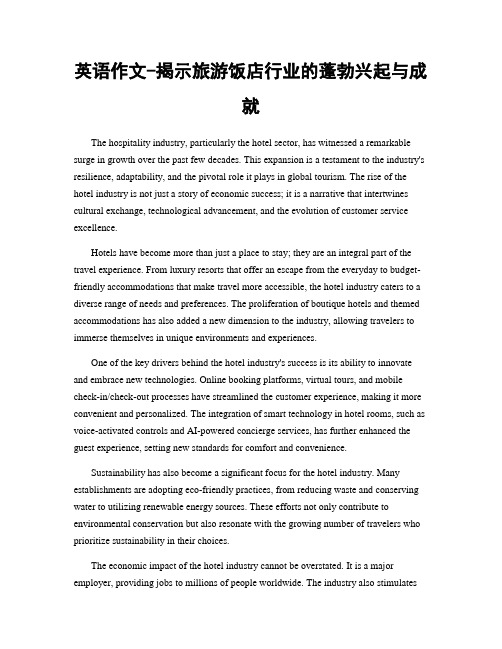
英语作文-揭示旅游饭店行业的蓬勃兴起与成就The hospitality industry, particularly the hotel sector, has witnessed a remarkable surge in growth over the past few decades. This expansion is a testament to the industry's resilience, adaptability, and the pivotal role it plays in global tourism. The rise of the hotel industry is not just a story of economic success; it is a narrative that intertwines cultural exchange, technological advancement, and the evolution of customer service excellence.Hotels have become more than just a place to stay; they are an integral part of the travel experience. From luxury resorts that offer an escape from the everyday to budget-friendly accommodations that make travel more accessible, the hotel industry caters to a diverse range of needs and preferences. The proliferation of boutique hotels and themed accommodations has also added a new dimension to the industry, allowing travelers to immerse themselves in unique environments and experiences.One of the key drivers behind the hotel industry's success is its ability to innovate and embrace new technologies. Online booking platforms, virtual tours, and mobile check-in/check-out processes have streamlined the customer experience, making it more convenient and personalized. The integration of smart technology in hotel rooms, such as voice-activated controls and AI-powered concierge services, has further enhanced the guest experience, setting new standards for comfort and convenience.Sustainability has also become a significant focus for the hotel industry. Many establishments are adopting eco-friendly practices, from reducing waste and conserving water to utilizing renewable energy sources. These efforts not only contribute to environmental conservation but also resonate with the growing number of travelers who prioritize sustainability in their choices.The economic impact of the hotel industry cannot be overstated. It is a major employer, providing jobs to millions of people worldwide. The industry also stimulateslocal economies by sourcing products and services from local businesses, supporting a wide array of industries from agriculture to entertainment.Moreover, the hotel industry has been instrumental in promoting cultural exchange. By hosting travelers from all corners of the globe, hotels act as crossroads where cultures meet and interact. This cultural interplay enriches both guests and host communities, fostering understanding and appreciation for different ways of life.The achievements of the hotel industry are not without challenges. Economic downturns, changing travel patterns, and global events can have a significant impact on the industry's performance. However, the industry's ability to adapt and innovate has allowed it to weather these challenges and emerge stronger.In conclusion, the flourishing of the hotel industry is a multifaceted phenomenon. It reflects the changing dynamics of travel, the evolution of consumer expectations, and the industry's commitment to excellence. As the industry continues to grow and evolve, it will undoubtedly remain at the forefront of global tourism, offering new and exciting experiences to travelers around the world.This essay has explored the vibrant rise and accomplishments of the hotel industry within the tourism sector, highlighting its significance, innovation, and contribution to the global economy and cultural exchange. The industry's future looks bright, with endless possibilities for growth and transformation. 。
- 1、下载文档前请自行甄别文档内容的完整性,平台不提供额外的编辑、内容补充、找答案等附加服务。
- 2、"仅部分预览"的文档,不可在线预览部分如存在完整性等问题,可反馈申请退款(可完整预览的文档不适用该条件!)。
- 3、如文档侵犯您的权益,请联系客服反馈,我们会尽快为您处理(人工客服工作时间:9:00-18:30)。
业将为国民经济和社会发展做出更大贡献。 yu ro? o p dn 对不起请再浼_遍好吗? m d o ra C d u y 1 学习英语的 重要性 全球化的时代已经来临, 贸易往来、资讯传 4旅游酒店中英语语言的重要性 r etht l 8 请您重客 自 e a t ,e e p ap a ? 好吗? 可 以 递、文化交流……更是任何国家赖以 生存的不二 旅游酒店是游客们暂时的家, 是从国外来到 E cs es. i D 法则, 因此迈向国际化才是现代 ^ 的生存之道, 中 中国的游客概 皂 之处 。 从大处来讲, 旅游酒店服务 将不明白的部分重复—遍 ,如:xuem , r o 国是发展中的大国,要想在全球化的背景下得以 的好坏关系到游客对中国的印象 ,直接影响到中 yum a o otyu om ky o enyul orlo e?不好意思。 s 先 S/ ̄看 , J 旅游酒店的服务 生, 您是说您丢了房间的钥匙? 继续发展, 中国人就 琪有 国际观, 并且具有英 国对外旅游业的发展;k ' 语口语的沟通能力, 才有资格踏人国际的世界。因 质量关系到每个游客的切身利益,关系到旅游景 在与客 ^ 交谈的时候, 应正视对方的眼睛, 以 所 不 和诚意。在面对语言不通的外籍 为荚语是世界最广泛使用的语言,全球有 4亿人 区和旅 游酒店 的生存 与发展 , 以说 , 断提 升旅 显示出你的停 一定要多加利用肢体语言。 把英语作为第一或第二语言来使用,目 前世界纸 游酒店的硬件设施和软件管理与服务,是旅游酒 人士时, 特别 相 在日 常接待工作中,还需要多了解—些西方 质出版物使用英语的占 大多数,公开发表的世界 店永 久不 懈的追求 , 是旅 游酒 店 的服务 , 比 流科学论文几乎都使用英语,国际互联网内容 之 下显得 非常重 要。 文化, 这样有助于进—步的沟通与交流。 英语 学习 中使用英语的占总量的 8%。 0 因此, 熟练掌握英语 但脯 级—些的旅游酒店服务人员都要会二 要注意文化差异。比 方说“ 浓咖啡” 用英语应该怎 些英语的, 如果不掌握英语, 国游客来 了提出一 么说? 外 可能有的中国学生会说成‘ cfe” oe, 便成为现代 人 必备的素质。 2英语口语的重要性 些住宿、 、 餐饮 旅游等要求, 酒店服务人员就无法 或是“rn o e" s ogc e , t f 但英语 中说 的是‘l kcf 'a 0 bc _ e' 。 更谈不 E 很好地为外国客人服好务。从长远 fe’ 在全球经济体系中, 英文成为重要的沟通语 理解, 言, 要与世界接轨, 流利的口 语能力势将成为重要 发展来看,只会简单的英语语言已经不能满足 日 有些捕 况则与以往不 同,已有的英支镝洵 的 的关键。 虽然, 有很多中国人的英文读写能力相当 益红火 的旅 游事业 的发展 。 表意往往并非是单词的真正意思 ,如果一不留神 就会 酿 ‘ I 尬”闹 荚 j 鏊 . 笑话不说, 表错了意有时 不错 , 但口语的表达和理解能力, 对於大多数中国 5旅游酒店中英语语言的应用 人而言却是— 障碍。 因此 , 在这个充争愈趋激烈 旅游酒店应当以酒店服务人员英语工作技能 还会带来不少误会。 Lo u! 如:o ko t当心 !不是“ ( 向 的市场上, 英语口语能力便成为英语教育中非常 发展为中心, 将英语语言与岗位服务功能相结合 , 外看”; l a e多可惜 ! ) aa hm ! 珊 ts 真遗憾!不是‘ ( ‘ 多 重 的一环。 将相同岗位不同的英语服务技能构成若干实训项 可耻”。 ) 实际上这些正确的表达法中国学生都是 3中国 旅游业的 发展 目 ,以不同的岗位服务功能构成若干饭店英语服 见过的, 那为什么还会出现错误呢? 就是因为在看 中国是世界 四大文明古国中现存最大的国 务实训模块 , 通过这些模块的综合实践 , 提高新的 的时 候投有停留, 没有进行对照和对比, 没有思考 度, 幅员辽阔, 经济的 高速发展, 社会安定团结 , 人 酒店人的酒店英语实用职业技能, 包括: 用英语与 和 强化记忆 。 民生活富足,为中国的旅游业开劈 了广阔的发展 客人交流沟通的能力 ,酒店英语礼仪服务得体应 6如何提高旅游 ^ 才的英语语言能力 空间; 加上中国的南北跨度大 , 东西纵横长 , 民族 用能力 , 酒店英语服务实际操作技能 , 用英语处理 以学生酒店英语服务能力发展为中 , 课 心 将 众多 , 地方文化差异大 , 旅游资源十分丰富 , 我们 投诉的能力,用英语解决突发事故的应变能力以 堂学习和( 岗位 ) 实践结合; 将英语语用能力的培 中国有伟大的万里长城、 故宫、 兵马俑、 九寨沟、 丽 及用英语进行个性化服务的能力 ,提高旅游酒店 养与英语服务技能养成结合; 侧重听说; 将服务漉 江、 西双版纳、 长江、 黄河、 泰山、 庐山、 黄山等; 中国 的接待与服务能力, 更好地为游客服务。 程与要求, 案例演练提高设}缶专业 卜 英语教学和 人口众多, 正在全面进 ^,康社会的, f 、 国民收入的 在酒店里所使用的英语会话 ,基本 是属于 职业英语技能的养成中, 通过情景模拟,案例演 增加, 为旅游业的发展奠定了丰富的物质基础。因 商业英语 ,与日常生活会话中所使用的英语略有 练 , 任务式, 讨论式等多种教学方法, 培养学生酒 此, 中国的旅游现正在朝着国内旅游大国、 入境旅 不同, 较注重礼节。 正式英语通常会让 人误解为极 店英语服务应用能力。 游大国、 出境旅游大国发展。 艰深的英语 , 其实, 多数时候只要套用一定格式的 6 英语语用能力。 1 英语语用能力是指听说 读 人世是中国旅游业分化重组的催化剂,面对 句子和单词, 就可以了。 写译五种技能综合应用的能力。但由于酒店英语 人世的冲击, 旅游企业都积极应对, 中国的旅游 使 不要说 O S r, eh K,ueY a 等等 , 而要说 C r i— 首先是一种服务语言, etn a 他要与外国客人交流与沟 得到了快速稳健的发展。世界旅游组织报告指出, l , i ySr . 通, 这就需要听说领先。 而听对高职学生而言又是 包括 中国在 内的亚太地区旅游业在全球发展最 He,hh hH n n等等 , yu- u , ago 也不适合在酒店 最难的。 听不懂就无法交流 , 再好的酒店服 务技能 快 ,中国入境旅游平均增速高于全球 3 个至 5个 中使用 。 也是没用的, 所以把“ . 听’ 放在了最重要的位置。选 百分点。 20 年至 20 年, 从 00 0 8 我国旅游业总收人 别说 “ d qk o .回答 “ 知道 ” 非常 不 择听的最佳时间, I a nw” n 不 是 讲解听的技巧 , 挑选有趣味或以 年均增长 1. 延续了改革开放以来年均两位数 礼 貌的说法 。 2 %, 5 他种方式训练过的语言材,以听开始其他技能活 的增长势头。 可 以说 ‘ s amo e pes.l cekta 动努力提高他们听的能力。 ' t m  ̄.lae' h c ht j u Il 尽管金融危机带来了全球总需求的疲软 , 会 fr o. 请稍候, o u y ”( 我来帮您确认 )然后请有能力 , 6 2酒店英语服务实 操能力 ,即按 s v e ei rc 对中国旅游业带来不利影响,但中国旅游业面临 处理的人前来协助。对男性客人, 尊称为 Sr i; 面对 poeu 服务流程和要求完成服务的能力 。如: rcdr e 的重大机遇和基本环境没有改变 ,旅游业总体发 女性客人时尊称为 M . s R o e r t n房间预定) om R s v i ( e ao , 在获得所有的订房 展趋势也不可能改变或逆转 当前我国的旅游消 在招呼客人 时 , 说“ xuemeSrMs” 信息之后一定要有一个 C n r ( 最好 E c s ,i ), ( of m 确认 ) o i 。Fr x mpe .Mis t o '�
科
改 革 与l J Il 探讨
英语语言为旅游酒店发展插上翅膀
王 君
( 浙江旅游职业学院, 浙江 杭州 3 13 ) 12 1
摘 要:发展的必备条件。 在这种国际化、 全球化的背景下, 旅游酒店必须注重对人力资
源的英语语 言的培训 , 不断提升服务层面的软 实力, 主动适应市场需求, 国际化的趋势, 适应 充分发挥英语语言的魅力, 为旅游酒店发展插上翅膀。
